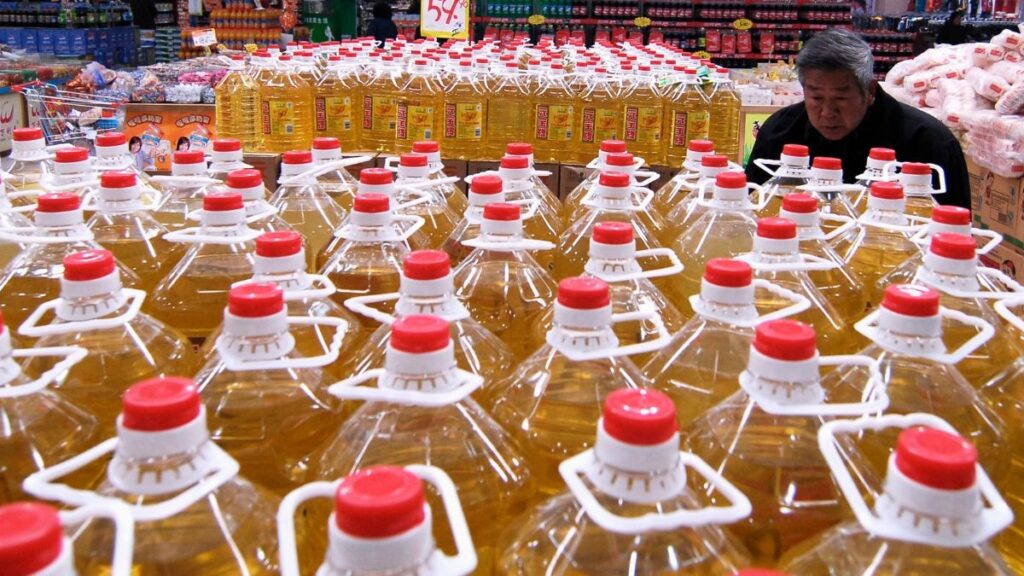A customer looks at bottles of cooking oil at a supermarket in Xiangyang city, Hubei province, on January 24, 2008. The transportation of cooking oil in trucks used to transport chemicals has sparked outrage in the country. File photo/Reuters
A new cooking oil scandal in China is raising concerns about food safety, with uproar erupting in the Asian country after reports emerged that fuel tankers were being used to transport cooking oil.
An undercover investigation by state-run daily newspaper Beijing News revealed the practice was an “open secret” in the transportation industry. The report, published on July 2, sparked outrage on Chinese social media.
Let’s understand what’s going on.
China’s edible oil problem
Tanker trucks that transport fuel and chemicals are also being used to transport edible oil and syrup without cleaning them beforehand, the Beijing News Agency reported.
The report names China’s state-owned food company Sinograin as one of the companies allegedly involved in the practice. Another state-owned company, Hopeful Grain and Oil Group, is also mentioned in the article.
A man rides a bicycle in front of a storage facility of China’s state-owned grain reserve company Sinograin near the port of Tianjin, China, December 12, 2019. File Photo/Reuters
Nikkei Asia reported that several truck drivers told Beijing News they had taken the measure to “cut costs.”
According to Business Insider, a Beijing News report found that a tanker truck from Hebei province was transporting chemicals to Qinhuangdao, before arriving in Sanhe a few days later to load soybean oil.
Truck drivers alleged that in some cases, drivers were transporting industrial wastewater before transporting edible oil.
Big fuss in China
The report last week caused a huge uproar on Chinese social media platforms amid concerns about possible food contamination.
According to a report by Nikkei Asia, Yun Wuxin, a Beijing-based writer specializing in biology and food engineering, wrote in an online post that such practices were a “serious violation of food safety work regulations”, adding that if the containers were used for non-food materials they would become “non-food grade”.
Gaining “food grade” status again requires a complicated process involving rigorous investigations. “The operational costs are very high,” Yoon says.
Chinese state media also commented on the scandal.
State broadcaster CCTV said the issue showed “extreme disregard” for people’s health and such misconduct could “cost lives” to citizens.
The Communist Party’s newspaper, the People’s Daily, called for a “thorough investigation and correction.”
“Ensuring food safety requires consistent adherence to the strictest standards, rigorous oversight and toughest penalties,” the ministry said in an editorial, according to the South China Morning Post (SCMP).
Hu Xijin, a former editor-in-chief of state-run tabloid Global Times, also called for an investigation. “Sinograin is a powerful state-owned enterprise. I find it hard to believe that Sinograin was the only one to behave like this when all the other companies seem clean,” he was quoted as saying on social media.
Investigation begins
The China Food Safety Commission will investigate the edible oil scandal, state media reported on Tuesday (July 9).
The State Council’s Food Safety Commission will hold a special meeting with state planning agency the National Development and Reform Commission, the National Food Reserve Administration and other ministries and agencies to investigate the allegations, Reuters reported, citing state-run CCTV.
“Illegal companies and associated responsible parties will be severely punished in accordance with the law and will not be tolerated,” CCTV said.
Cooking oil is once again at the center of food safety concerns in China. File photo/Reuters
Amid the furor, edible oils produced by conglomerate China Grain Reserve Corp. were removed from major online stores including Taobao and JD.com, Bloomberg reported.
Sinograin, the company at the centre of the controversy, said last week it had launched an investigation into “mixed tanker use” and said in a statement it had blacklisted the tanker operator as a partner.
Several publicly listed companies have reportedly denied that their supply chains had been compromised “after internal investigations.”
China’s food safety issues
Repurposing fuel tankers is not new in China, where the Asian giant has been battling food safety concerns for years.
In fact, these concerns are driving Chinese consumers to switch to foreign brands.
Reports of “harmful chemicals” being mixed into cooking oil during transportation also surfaced in 2005, according to Business Insider.
In 2008, milk powder was found to contain lethal amounts of the industrial chemical melamine, affecting 30 million (30 million) children across the country. The scandal led to Beijing paying 2 billion yuan (Rs 229.5 million) in compensation.
A similar report was made in 2010.
About a decade ago, China cracked down on restaurants that reused drain oil and sewer grease.
The Chinese government has been stepping up food safety controls and trying to convince importers that its products are safe.
In 2014, regulations recommended that edible oil be transported in dedicated tanks. However, this guideline is not mandatory.
A Beijing-based political scientist, speaking on condition of anonymity, told Nikkei Asia that while stricter inspections could lead to regulatory changes, it would be difficult to prevent problems from occurring.
“The fuel tanker issue is just a microcosm of the problem of ‘inwardness’ among Chinese companies,” he said, using Chinese jargon that means increasing labor inputs does not result in a proportional increase in output.
“Like most industries, the margins in the transportation sector are very low. If any company were to use dedicated tankers to transport edible oil, they would have to bear the empty round trip costs in addition to tank cleaning charges of over $100. [Rs 8,349]”Every time.” “That would potentially wipe out all the profits, and companies aren’t going to do that,” the political scientist said.
Opinions from agencies
![]()
Find us on YouTube
subscribe
Source link


